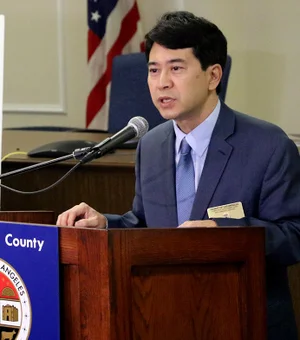
Robin Toma

Robin S. Toma, is Executive Director of the Los Angeles County Commission on Human Relations, appointed in 2000. Under his leadership, the agency is working to transform prejudice into acceptance, inequity into justice, and hostility into peace. By building community capacity and focusing in key areas, racialized gang violence has been lessened. Through demonstration projects in high schools, the power of integrating human relations strategies into school campuses have brought about greater inclusion, harmony, reduced fighting and conflict, and improved academic performance. The Commission’s signature annual report on hate crime in the county has shown a long term trend downward in hate crime until recent years, while the Commission has invested in hate violence prevention community partnerships and training peacemakers countywide.
Robin’s published writings include A Primer on Managing Intergroup Conflict in a Multicultural Workplace, Day Laborers Hiring Sites: Constructive Approaches to Community Conflict (co-author with Jill Esbenshade), and he contributed a piece on racialized gang violence in the book Uncommon Common Ground: Race and America’s Future.
Robin also serves as President on the board of directors of the International Association of Official Human Rights Agencies (IAOHRA), and was President of and is on the Board of the California Association of Human Relations Organization (CAHRO). He’s been a Senior Fellow at the UCLA Luskin School of Public Affairs since 2009, and had the privilege to be part of the Harvard University’s Kennedy School of Government’s Executive Session on Human Rights Commissions and Criminal Justice (2006-2008), and the Kellogg National Fellowship/Leadership Program (1994-97). He was appointed by the U.S. Commission on Civil Rights to serve on the California State Advisory Committee (2012 to present), and helped create and serves on the L.A. Unified School District’s Commission on Human Relations, Diversity and Educational Equity. He served three years on the national interim leadership team of the Within Our Lifetime Network for Racial Equity and Healing.
In August 2014, Robin spoke in Geneva on the review of the U.S. Government’s compliance with the treaty to eliminate racial discrimination (CERD), and was an invited adviser to the Obama Administration’s delegation to the U.N. Human Rights Council in Geneva, for the U.S. first-ever presentation on its human rights record as part of the United Nations’ Universal Periodic Review process in November 2010. He was also invited to serve on the official U.S. Delegation to the U.N. World Conference Against Racism in Durban, South Africa, in 2001.
Robin is the son of Americans of Japanese and Okinawan ancestry; his mother and her family spent World War II imprisoned in the U.S. internment camps solely because of their Japanese ancestry. Robin’s paternal grandfather was an immigrant Okinawan sugar cane plantation worker in Maui. Robin grew up in the Echo Park/Silver Lake neighborhoods of L.A., attending LAUSD public schools. He received a B.A. with the highest honors in Sociology and honors in Economics from University of California at Santa Cruz; and a J.D. degree and M.A. degree in Urban Planning from UCLA. Robin is fluent in Spanish, having studied and worked in Barcelona for two years, and was a teacher in L.A.’s public schools.
Prior to working at the Commission, Robin was a staff attorney at the American Civil Liberties Union Foundation of Southern California for almost 7 years, and litigated a wide range of human rights and civil liberties cases in federal and state courts, including the free speech rights of anti-nuclear weapons activists at shopping malls, Filipina nurses’ challenge to English Only workplace ban, UFW supporters’ rights to promote the grape boycott at Vons’ supermarkets, day laborers’ right to not be treated as criminals for merely expressing their availability for work, international human rights of a Mexican doctor kidnapped by federal agents, and a successful challenge on behalf of Latinos for denial of voting rights. He was also lead attorney in a class action lawsuit on behalf of Japanese Latin Americans which led to redress and an apology from the President for being forcibly brought to and imprisoned in the U.S. and used in prisoner exchange with Japan during WWII.